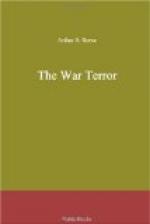“How about that bandage about Haughton’s neck?” I asked suddenly. “Do you think radium could have had anything to do with that?” “Well, as to burns, there is no particular immediate effect usually, and sometimes even up to two weeks or more, unless the exposure has been long and to a considerable quantity. Of course radium keeps itself three or four degrees warmer than other things about it constantly. But that isn’t what does the harm. It is continually emitting little corpuscles, which I’ll explain some other time, traveling all the way from twenty to one hundred and thirty thousand miles a second, and these corpuscles blister and corrode the flesh like quick-moving missiles bombarding it. The gravity of such lesions increases with the purity of the radium. For instance I have known an exposure of half an hour to a comparatively small quantity through a tube, a box and the clothes to produce a blister fifteen days later. Curie said he wouldn’t trust himself in a room with a kilogram of it. It would destroy his eyesight, burn off his skin and kill him eventually. Why, even after a slight exposure your clothes are radioactive—the electroscope will show that.”
He was still fumbling with the glass plate and the various articles on it.
“There’s something very peculiar about all this,” he muttered, almost to himself.
Tired by the quick succession of events of the past two days, I left Kennedy still experimenting in his laboratory and retired, still wondering when the real clue was to develop. Who could it have been who bore the tell-tale burn? Was the mark hidden by the bandage about Haughton’s neck the brand of the stolen tubes? Or were there other marks on his body which we could not see?
No answer came to me, and I fell asleep and woke up without a radiation of light on the subject. Kennedy spent the greater part of the day still at work at his laboratory, performing some very delicate experiments. Finding nothing to do there, I went down to the Star office and spent my time reading the reports that came in from the small army of reporters who had been assigned to run down clues in the case which was the sensation of the moment. I have always felt my own lips sealed in such cases, until the time came that the story was complete and Kennedy released me from any further need of silence. The weird and impossible stories which came in not only to the Star but to the other papers surely did make passable copy in this instance, but with my knowledge of the case I could see that not one of them brought us a step nearer the truth.
One thing which uniformly puzzled the newspapers was the illness of Haughton and his enforced idleness at a time which was of so much importance to the company which he had promoted and indeed very largely financed. Then, of course, there was the romantic side of his engagement to Felicie Woods.
Just what connection Felicie Woods had with the radium robbery if any, I was myself unable quite to fathom. Still, that made no difference to the papers. She was pretty and therefore they published her picture, three columns deep, with Haughton and Denison, who were intimately concerned with the real loss in little ovals perhaps an inch across and two inches in the opposite dimension.




